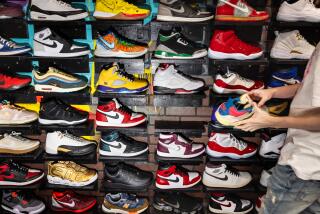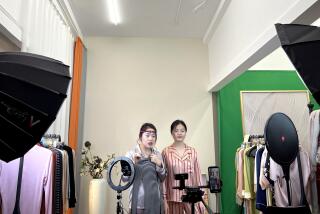Chinese Shoe Firm Steps Up Its Game
- Share via
BEIJING — Swoosh and stripes, meet Brand X.
As sports shoe companies such as Nike Inc. and Adidas-Salomon jump into China with both feet, they face a firmly entrenched homegrown rival that’s hatching plans to trip them up: Li Ning Co.
For the record:
12:00 a.m. Dec. 29, 2004 For The Record
Los Angeles Times Wednesday December 29, 2004 Home Edition Main News Part A Page 2 National Desk 1 inches; 39 words Type of Material: Correction
Li Ning -- A photo caption with an article in Saturday’s Business section about Chinese shoe manufacturer Li Ning Co. failed to credit the photographer. The photo of Li Ning marketing director Abel Wu was taken by Cherilyn Parsons.
For years, the Beijing-based athletic footwear and apparel manufacturer has had the run of a domestic market that is now just finding its 2.6 billion legs.
The company posts annual sales of about $200 million hawking affordable, no-frills sneakers to the masses, which long have valued price over style and performance. Revenue and profit for the first six months of 2004 are up 50% from the same time last year, according to the company’s latest report.
But now that high-end competitors such as U.S. firm Nike (with its highly recognizable swoosh) and German firm Adidas (with its signature stripes) have discovered China’s burgeoning appetite for hip international brands, Li Ning finds itself on the defensive.
As it prepares to fight back, China’s leading domestic sportswear manufacturer has taken a page from Mao Tse-tung, the late Communist leader whose ragtag troops scored an underdog victory over a larger Nationalist Army in 1949 by building their base in rural areas and attacking from there.
“We are familiar with the history of China, with how the Communists defeated the Nationalists,” said Abel Wu, Li Ning’s marketing director. He said the firm’s strategy was “similar to what Mao did.”
Li Ning is just the latest domestic brand facing an onslaught of powerful foreign competitors, a trend hastened when China joined the World Trade Organization in 2001 and began lowering trade barriers. The biggest hurdle -- the requirement that foreign firms create joint ventures with China-based partners -- is now history, leaving overseas companies free to compete on their own terms.
The competitive pressure, said one business expert, has winnowed weaker domestic brands. But it has also produced a number of Chinese companies that, through a combination of innovation and imitation, have bulked up to compete with big corporations here and abroad.
“Many will die, but the end result is not going to be a market dominated by foreign players,” said Oded Shenkar, Ohio State University professor of international business and author of the book “The Chinese Century.”
“This is a country that maybe doesn’t take the Communists seriously anymore but has a strong national feeling,” he said. “It is something that can be leveraged.... The end result will be the emergence of Chinese multinationals.”
But unlike Mao, who consolidated his forces while taking refuge in the caves of Yenan, Li Ning has nowhere to hide. And instead of battling one foe, the company faces a swarm of formidable competitors muscling into a market estimated to be as big as $5 billion a year.
Nike and Adidas have been hanging around China for years, quietly building brand loyalty through grass-roots basketball clinics and boutique sales. Their target is a middle class that, by Adidas’ estimates, is expected to surge from 60 million consumers in 2002 to 150 million by the end of the decade. China’s population is 1.3 billion.
Now Canton, Mass.-based Reebok International Ltd. is taking the plunge with a campaign featuring favorite son and National Basketball Assn. star Yao Ming.
All three firms are aiming to dramatically increase their retail outlets by 2008, when Beijing hosts the Summer Olympics.
Their hope, said one industry analyst, is that the Games will galvanize a growing Chinese interest in sports and thus create a huge appetite for the latest in designer basketball, soccer and running wear.
“They think it’s going to be a major turning point for Chinese consumer interest in athletic footwear and apparel,” said analyst John Shanley of Susquenhanna Financial Group.
Nike and Adidas are already experiencing healthy increases in their Asian sales.
An Adidas spokesman said the company’s China revenue was doubling every year and had far exceeded the $133-million mark. Nike’s sales are growing so much in China, Shanley said, that the nation will eventually surpass Japan as the company’s second-largest market, behind the United States.
Shanley downplayed the effect of Nike’s marketing gaffe this month, when an offended Chinese government banned the ad campaign featuring NBA phenom LeBron James kicking cartoon dragons and other characters in Chinese attire. Nike apologized -- and it has a reservoir of commercial goodwill.
A recent marketing survey of 1,200 Beijing and Shanghai college students, key consumers for upscale sneakers, proclaimed Nike as China’s “coolest” brand -- ahead of Sony Corp., Adidas, BMW and Coca-Cola Co. A recent Time magazine cover story all but crowned Beaverton, Ore.-based Nike as China’s sneaker king.
But Li Ning executives say they aren’t ready to raise the white flag just yet.
“We think we have a respectable competitor from the United States. They have a good image. They have a lot of sports stars as sponsors,” said Wu, Li Ning’s marketing director. “However, we know how to survive in these tough conditions.”
Part of that survival hinges on the company’s roots. It was founded in 1989 by one of China’s biggest sports heroes, the namesake gymnast who won three Olympic gold medals at the 1984 Los Angeles Summer Games.
“Many Chinese people take pride in him” not only for his athletic exploits but also because of his business success, said Ding Jingli, a local ad executive.
Like Mao, the company has forged its strongest bond with the heartland, where it has most of its 2,600 stores and retail outlets. Li Ning’s primary targets are low- to middle-income consumers living in rural areas and provincial cities largely passed over by the economic boom. Overall, China still has a per capita annual income of only $1,100, about 5% of the U.S. level.
That presents a hard financial reality for customers like Wei Lin, 20, who dreams of owning $170 Air Jordans but ends up shopping for Li Nings, which go for closer to $50.
“Adidas and Nike are better than the Li Ning brand, but I have economic limits,” said Wei, as he recently tried on the cheaper shoes in downtown Xian.
That sentiment is not lost on Li Ning executives. Although they’ve vowed to remain committed to their less-than-affluent customers, they’ve also been busy retooling the company to move beyond its one-style-fits-all image and capture a share of the high end.
With Nike breathing down its neck, Li Ning overhauled its management in 2002 and brought in top officers from companies such as Avon Products Inc., Proctor & Gamble Co. and DuPont Co.
The company created an international design center in Hong Kong, pumped up its marketing budget and struck deals to sponsor China’s 2004 Olympians, as well as other high-profile squads such as Spain’s Olympic men’s basketball team, which defeated China in Athens.
Li Ning also had a $76-million initial public offering in June, then invested a portion of the money on promoting and selling a new line of high-performance basketball shoes intended to snag serious weekend warriors.
“Our objective is to ensure our product can match Nike in 2007,” Wu said. “If my product is the same as Nike and my price is 70% of Nike’s, then I have a competitive advantage, right?”
First out of the box: a basketball shoe introduced in July called the Free Jumper, made for professional players and featuring the company’s first stab at sneaker high-technology. The model uses materials to give extra bounce on the ball of the foot and extra cushion on the heel.
Within three months, the company sold 16,000 pairs, priced at $68 and $83. More designs are on the way, Wu said, and eventually Li Ning wants to sign an NBA star to promote its basketball line as part of its plan to go global within 10 years.
For the most part, though, its focus remains on its home court. “Probably in a year or two, we will lose our lead,” Wu said. “But our target is definitely to be No. 1 in China.”
More to Read
Inside the business of entertainment
The Wide Shot brings you news, analysis and insights on everything from streaming wars to production — and what it all means for the future.
You may occasionally receive promotional content from the Los Angeles Times.










